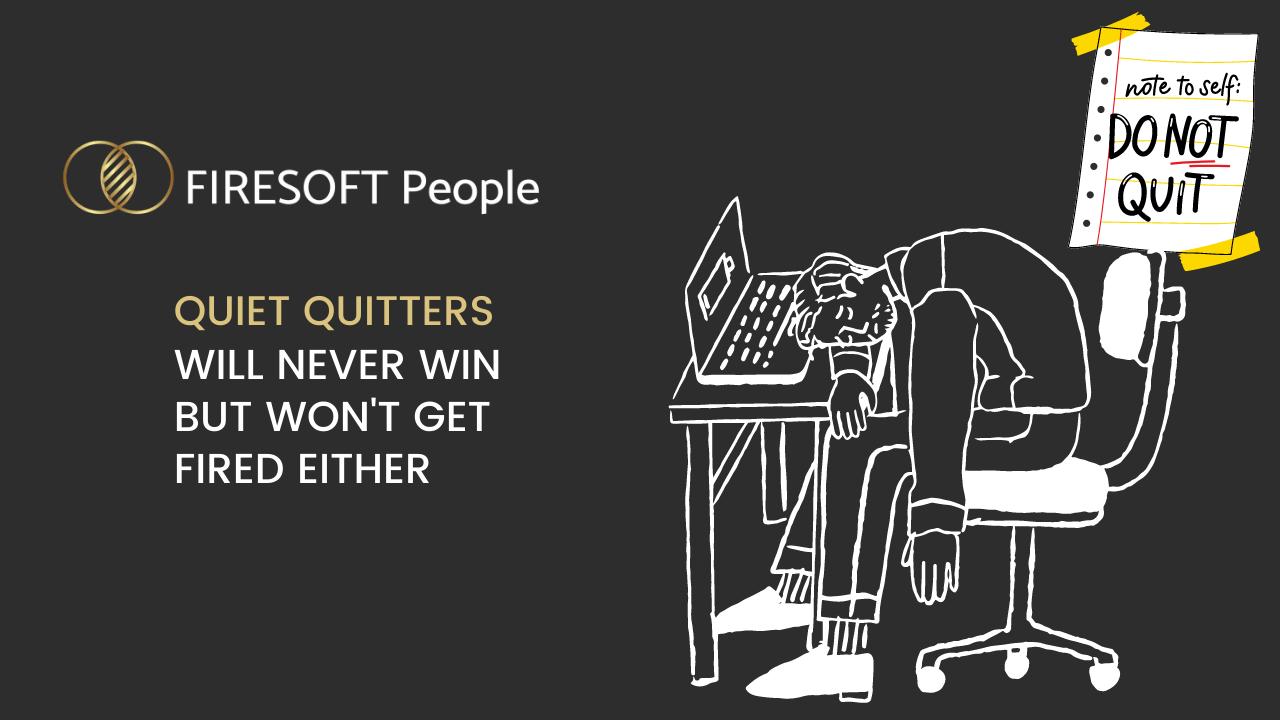Quiet Quitters Will Never Win but Won't Get Fired Either

The concept of Quiet Quitting has taken the world by storm since this viral TikTok video was released. This new buzzword is trending on social media, and with more than 30 million views for #quietquitting on TikTok, there's a good reason that people are talking about it. Quiet quitting is defined as not exerting extra effort at work while not getting into any trouble that could potentially have someone fired. It's become a catalyst for people to prioritise mental health and overall well-being in the workplace. The Great Resignation started this movement with people realising their priorities in life. Now more than ever, mental health is propelled to the forefront and is no longer a taboo topic. More people want to talk about it and want to be heard.
For the longest time, the hustle culture of going above and beyond company expectations, answering work calls, messages, and emails after hours, and rendering overtime have been the mindset to get that recognition you feel you deserve. This mindset has driven people to feel underappreciated, underpaid and burned out, causing them to take a step back and do the bare minimum. Effects of how you feel at work could be brought at home, too. If you find yourself feeling this way, it could be a sign of unhappiness. Quiet quitting may not be a sustainable answer to burnout. It's a quick fix without the risk of getting fired. While looking after one's well-being is essential, seeking help is equally important when you feel like you are pushed to the edge. There are ways to combat burnout without taking the backseat.
Seek Help
Co-workers or your manager won't know you're struggling if you won't say anything, and there's no one better to share your story than yourself. Talk to your manager and be open with how you're feeling about your current role. This conversation could go so many ways, such as seeking more training, showing interest in more tasks, working towards a promotion, asking for a raise, voicing out that you feel overworked, or simply wanting to be heard by your manager and getting their advice. You may even consider seeking professional help from a therapist. Many companies have invested in incorporating mental wellness into their employee benefits. Now might be the best time to make use of it.
Set Healthy Boundaries
Cultivating a healthy relationship with your work will keep you going even when circumstances get tough. You can do this by not ‘taking work home’ with you and managing your work hours efficiently. Getting your tasks done within work hours will give you a better sense of accomplishment. If you’re in a job where the workload is impossible to fit into your work hours, practice the art of prioritisation and accept that there is only so much you can do without causing too much stress on yourself.
Setting boundaries will also allow you time to venture into other things, such as a series you have been dying to watch, a class you've been looking into attending, a weekend with your family, or even earn extra money with a side hustle. Spending time on things you're passionate about can give your mind a break and a sense of accomplishment.
Change of Mindset
Often, we tie our identities to our jobs, and when we don't receive any recognition for our work, we end up disappointed. Work isn't the defining factor of who we are. It's only a part of the big picture we paint for ourselves. You may also want to reach out to a work friend or a trusted mentor to give you a different insight into your situation. Having a healthy support system with colleagues will not only help give you a sense of belonging, but it may even help manage stress levels.
Self-assessment
If you're miserable, it may be time to reevaluate your priorities and what you want from a job. It's better to leave than to stay in a place where you know you won't grow or feel fulfilled.
They say quitters will never win, but quitting isn't bad in certain circumstances. Quiet quitting, however, may not help solve the problem. It's important to remember that happiness is complex and fleeting. Achieving happiness in the workplace is a personal journey, not a final destination.
If you're looking for a change of pace, a different environment, or a new challenge, we might have the thing for you. Visit our live jobs here to help you start your journey.
Other suggested reads for you


